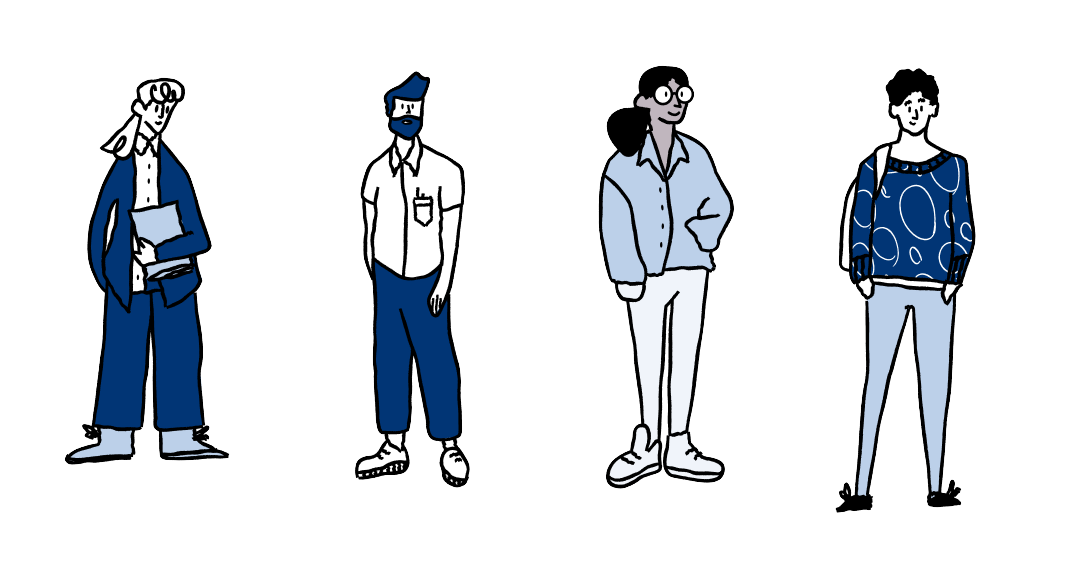Working on your relationship in the short term
Relationships are a lot like jigsaw puzzles. Each person brings their own unique pieces, assembly strategy, experience, and level of commitment to the table.
Sometimes a ‘relationship puzzle’ comes together easily; both people like to start by finding all the edge pieces and won’t give up until they can see the complete picture.
Other times, the pieces can be more difficult to put together. This can be because one person cares more than the other, there are pieces that don’t seem to fit, or there are pieces missing altogether.
In the same way that it can take a lot of time and effort to complete a puzzle, relationships require patience, dedication, and cooperation to make them work.
On this page, you’ll find tips for:
- Managing emotions
- Seeking support
- Understanding why we stay
- Making tough decisions
- Having difficult conversations.
If you're looking for information on how to move forward after a relationship ends or ways to build healthy relationships, you can visit our long-term help page.
Scroll down to learn more.
Managing emotions
One of the ways we build and maintain healthy relationships is by having open and honest conversations about how we’re feeling and expressing what we need to feel safe, loved, respected, and secure.
These conversations can be really hard when the relationship has faced challenges and emotions are high. It’s normal to feel angry, scared, or worried about the other person’s reaction and feel a sense of desperation to get your point across.
Because our body’s natural stress response to perceived threats is fight, flight, or freeze mode, it’s also normal to find yourself mentally and physically overwhelmed by emotions.
- When in fight, flight, or freeze mode, you might:
- Storm away
- Slam doors
- Yell or use name-calling
- Say something you regret
- Shut down and say nothing.
Fight, flight, or freeze mode is the way our body responds when it thinks we are in a threatening situation. It is there to protect us, but can also make us overreact in situations that aren’t actually a threat.
For example, your brain might respond to a heated argument the same way it would if a bear entered your living room.
Our fight, flight, or freeze response is automatic, meaning it’s not something we consciously make happen. If our brain senses danger, it’s going to let us know (physically and emotionally) and we are going to do all we can to protect ourselves.
Below is a short video explaining the fight, flight, or freeze response.
Tips for managing emotions
Thankfully, there are ways you can manage your emotions, calm your body, and regain control in the moment.
When emotions are high, you can:
- Try to identify if you’ve gone into fight, flight, or freeze mode: If you have, ask yourself if your response is appropriate for your current situation. If it’s not, remind yourself that you’re safe, which will help your body calm back down.
- Name what you’re feeling: If possible, get clear on what it is you’re actually feeling. Sometimes we react defensively or become angry when we actually feel sad, hurt or unloved. Journaling is a great way to help you work out what you’re feeling and why.
- Pause before responding: Try to pause between your reaction and action. This can help you avoid saying something you might regret later and give you time to understand and express how you feel. For example, you can count down slowly from 30 or ask for 20 minutes to process the conversation.
- Take the conversation outside: Walking, nature, and being side by side with someone (rather than face-to-face) are three ways to reduce stress and feel better!
- Take deep breaths: Using a grounding technique like deep breathing can help calm your mind, lower your heart rate, and reduce muscle tension. An easy breathing exercise to try is box breathing. Watch the video below to try it now.
Reaching out for support
Finding ways to work through your relationship or deciding to leave your relationship isn’t something you have to do on your own.
In fact, asking a trusted friend for their honest opinion or bringing in an external third party (like a therapist) can help you see or realise things you might be missing or avoiding.
It can also be helpful to reach out to a relationship support service like Relationships Australia.
Keep in mind that it can be extremely hard to accept that something might be wrong in your relationship. It’s okay if you need time to reflect and think about what to do.
- When you're ready, you can try:
- Talking to someone you trust
- Seeing a psychologist
- Speaking with your partner about seeing a relationship counsellor
- Reaching out to a relationship support service.
Understanding why we stay
More often than not, our relationships are a really big part of our lives.
Losing them can feel like we are losing a part of ourselves. That’s why it makes sense if we struggle to give them up or accept that things are really over.
But the truth is - there are a lot of unhappy people staying in unhappy relationships when they don’t have to.
- Why can it be difficult to leave an unhealthy relationship?
- Financial dependence: You might feel like you can’t leave because you don’t have enough money or earning capacity.
- Family pressure: If you have children, you might feel pressure to stay in a relationship or marriage ‘for the kids’.
- Stigma: You might feel embarrassed and/or ashamed by a relationship breakdown, separation or divorce.
- Religious/cultural norms: You might fear not being in a relationship and/or leaving a relationship due to the pressures and expectations from your community.
- Social norms: You might feel like you have to keep certain relationships ‘because they’re family’ or because you’re worried about reactions from peers.
Making tough decisions
It doesn’t matter what hurdle, roadblock, or guilt trip may lay in front of you, no relationship is ever worth sacrificing your mental and physical health and wellbeing.
Even though it might not always feel like it, you do have a choice and you deserve to choose what is best for your happiness and wellbeing.
Regardless of whether you decide to stay and work on your relationship, or make the difficult decision to leave, it probably won’t be easy, but you don’t have to do it alone. There are support services that can help.
- When you're ready, you can try:
- Attending couples counselling
- Contacting a free relationship counselling service like Relationships Australia
- Learning ways to have difficult conversations with your partner
- Getting help to leave a domestic and family violence situation.
Tips for having difficult conversations
Difficult conversations are an important way we create healthy relationships and work on or end unhealthy relationships.
It’s normal to want to avoid difficult conversations. They can be stressful and uncomfortable.
However, if you’re avoiding them because you don’t feel psychologically and/or physically safe to have a conversation with your partner, you may be experiencing domestic and family violence.
Ways to improve communication in your relationship
- Actively listen: Listen to understand the other person, and not just to respond. Try not to interrupt or respond before you have all the information.
- Validate their feelings: When someone feels understood, they're not only more likely to stay calm, but they’ll be able to listen better, too. You can try saying things like: ‘I get why you feel that way’ or ‘I can see this is hard for you’.
- Ask for what you need to feel heard: You can ask the other person to consider your side by saying, ‘Please think about where I’m coming from. Let's find a solution that works for both of us’.
- Avoid accusing or blaming: Using words that accuse or point fingers can make someone feel like they're in trouble. This often starts with ‘you’ and uses words like ‘never’ or ‘always.’ Saying things like, ‘You never listen’ can feel like an attack and make things worse.
- Use ‘I’ statements: One way to avoid accusing or blaming language is to express how you feel with ‘I’ statements. For example: Instead of: ‘You never do the dishes!’, you could try: ‘I feel like I’m not getting enough support at dinner time. Do you think you could help out by washing the dishes?’’
- Stay focused on the issue at hand: Sometimes we find ourselves arguing about one thing but it’s actually something else that we’re upset about. For example, you and your partner are arguing because they came home late. In reality, you feel like your partner hasn't been respecting you lately and this is another example of that. Taking time to journal your thoughts and feelings can help you see things more clearly. It’s also helpful to express that you feel hurt and suggest how things could go differently next time.
- Take accountability: Apologising for your actions can be tough because it can mean admitting you made a mistake, or facing uncomfortable emotions, like guilt. However, you can’t have a healthy relationship if you can’t take accountability. By demonstrating accountability, you’ll make it feel safe for the other person to be accountable, too.
- Knowing when you’re not getting anywhere: If emotions are too high or there are deeper communication issues beyond this interaction, you can always end the conversation or suggest having it with a third party or counsellor present.
To learn more tips for building healthy relationships or healing after a breakup, visit our long-term help page.
Click here to download, save, or print our relationships fact sheet.








